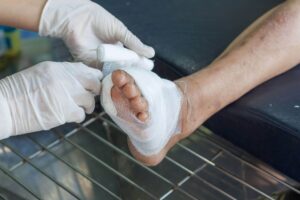
Our feet are incredibly resilient, but they are not immune to injuries or wounds. Foot wounds can be painful, slow to heal, and if left untreated, can lead to more serious complications. Understanding the various types of foot wounds and their proper care is essential for maintaining good foot health.
Common Foot Wounds
- Abrasions: Superficial scrapes of the skin, often caused by friction or rubbing against rough surfaces.
- Cuts and Lacerations: These injuries can vary in depth and severity, from minor cuts to deep lacerations.
- Blisters: Fluid-filled sacs that form as a protective response to friction or pressure.
- Puncture Wounds: Penetrating injuries from sharp objects like nails or glass.
Diabetes and Foot Wounds
For individuals with diabetes, foot wounds can be particularly concerning due to poor circulation and nerve damage. Diabetic foot ulcers are a common problem and require specialized care. Early detection and management are crucial to prevent serious complications, including amputation.
Advanced Wound Care Techniques
Advanced wound care for foot injuries may include:
- Debridement: The removal of dead or infected tissue to promote healing.
- Negative Pressure Wound Therapy (NPWT): Using vacuum suction to enhance wound healing.
- Hyperbaric Oxygen Therapy: Breathing pure oxygen in a pressurized environment to speed up healing.
Topical Medications
Various topical medications, such as antimicrobial ointments and growth factors, can be applied to foot wounds to facilitate healing and prevent infection.
Managing Chronic Wounds
Chronic wounds, including venous ulcers or pressure sores, require ongoing care. This involves wound assessment, infection control, and addressing underlying health issues contributing to the non-healing state.
Self-Care and Monitoring
For minor foot wounds, proper self-care is essential:
- Cleanliness: Keep the wound clean and dry to prevent infection.
- Dressings: Apply sterile dressings and change them regularly.
- Elevation: Elevate the injured foot to reduce swelling.
- Protection: Protect the wound from further trauma.
If you have a foot wound that is slow to heal, becomes infected, or if you have diabetes, seeking professional care is crucial. The DFW Wound Care Center specializes in the treatment of a wide range of foot wounds, offering advanced wound care techniques and a compassionate approach to healing.
Our clinics in Plano, Lewisville, Irving, and DeSoto are staffed with experienced wound care specialists ready to provide the care you need. Don’t let a foot wound become a serious health issue; contact us today to schedule an appointment. Your comfort and well-being are our top priorities, and we’re here to support your journey to healthy, pain-free feet.
Contact us
Schedule an appointment
with our specialists by contacting us or calling our:
